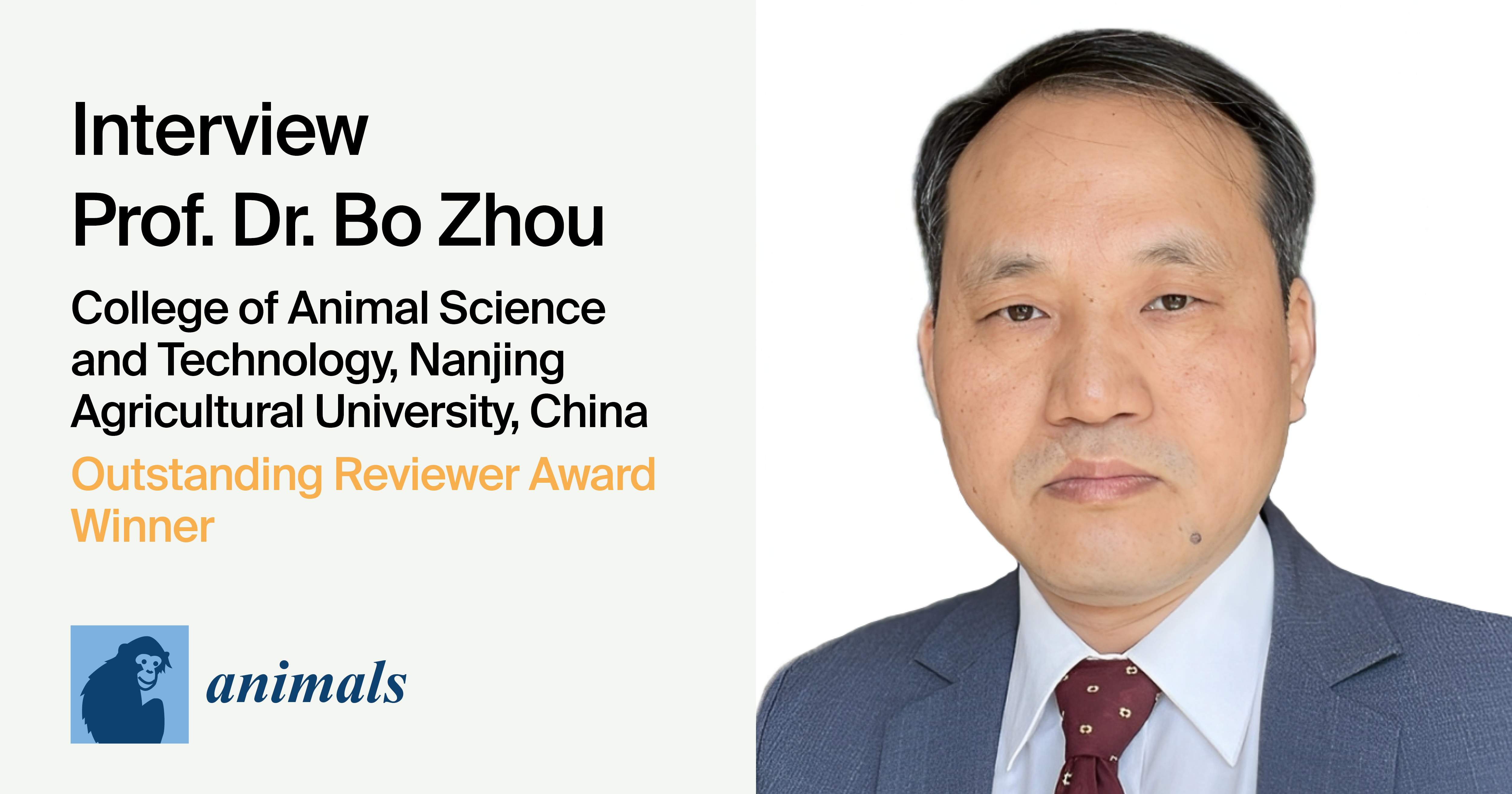
Interview with Prof. Dr. Bo Zhou—Winner of the Animals 2024 Outstanding Reviewer Award
We are pleased to announce that Prof. Dr. Bo Zhou is one of the winners of the Animals 2024 Outstanding Reviewer Award. The Animals Outstanding Reviewer Award is presented annually to recognize reviewers who contribute their time to reviewing papers and display thoroughness, professionalism, and timeliness while doing so.
We are honored to have had the opportunity to interview Prof. Dr. Bo Zhou, providing an opportunity to delve deeper into his research journey and his insights into being a reviewer.
1. Could you please provide a brief introduction of yourself to our readers and give an overview of your current research?
I'm a professor at the College of Animal Science and Technology of Nanjing Agricultural University. I teach and perform some scientific research. My research direction mainly focuses on the genetic breeding and reproduction of pigs and new technologies of intelligence in pig farming in particular; it focuses on the screening of molecules and markers of pig aggression and the analysis of molecules, genetic mechanisms, and the molecular genetic regulation of cell entrance behavior.
2. What led you to review for Animals? How did you hear about the journal?
The Animals journal is a famous journal in my field. It has a top JCR ranking and Impact Factor. I am also an author who has submitted to Animals. I received some email correspondence that encouraged me to review. After reviewing papers for Animals, I received some vouchers that can be used for my papers, so this is a motivation to be a reviewer for this journal.
3. How do you approach the peer review process to ensure fairness and constructive feedback? What are the key factors and aspects that you consider most when reviewing a manuscript?
First, I focus on the purpose of the paper, its aims and direction. Then, the materials and methods section. All aspects of the paper have to be considered to maintain balance in the review report. Sometimes, I receive a review request invitation for a paper that is not within my exact research focus. In this case, I have to study this field and do some research beforehand in order to provide a high-quality review report. It is a lot of work and takes quite a lot of time, too. After gaining this knowledge, you can give some good suggestions to authors. As a reviewer, I can also learn a lot this way.
4. What are the biggest challenges you face as a reviewer, and what are your tips for preparing a high-quality review report?
Preparing a high-quality review requires careful planning. You have to start with a lot of preparations—read the abstract, introduction, and conclusions to get the research idea and get familiar with the hypotheses. You need to learn more deeply and give some thought to the parts that need to be revised and give the authors your suggestions. For a high-quality review report, suggestions need to be more detailed, and you should tell the authors which line or paragraph they need to revise and how to revise it in the best way. You need to give precise suggestions, so you stand on the same ground as the authors.
5. We hope that the Outstanding Reviewer Award will open new opportunities for you. How does an award like this help to support the career of a researcher such as yourself?
Yes, this is strong support from the journal. This award can give me a chance to enrich my academic profile and can give more recognition to my scientific work in the community. It is very important. I shared the information about receiving this award across my social media, and many people showed their support and acknowledgement of my academic work.
6. What advice would you give to aspiring researchers looking to make a meaningful impact in their fields? What qualities do you think young scientists need?
For young researchers, my advice is to first focus on unsolved questions in science. Also, being flexible to do a lot of preparation to explore a certain research field and being open to adapting to other disciplines. It is important to be open to learning a lot on the way. I always recommend my Ph.D. students to read a lot of papers—it is the quickest way to learn how to write a scientific article and gain the necessary experience for the future.
7. Animals is an open access journal. How do you think open access publishing benefits authors and the broader research community?
Animals, as an open access journal, is very fast to publish papers. It’s free for readers, so it’s a good source of knowledge for researchers. Everybody can access the newest research articles. Easy access to the latest research is very important. I think that the publishing fee for Animals is the average amount compared to other publishers, which is good for researchers who want to publish in this journal. What is great is that reviewers can gain discounts that decrease the publishing fee, and scholars can save a lot of money by receiving these vouchers. Researchers want to publish in good-quality journals to find the right home for their papers. The Animals journal’s ranking and Impact Factor are proof of a good paper quality. It is important to maintain this quality.